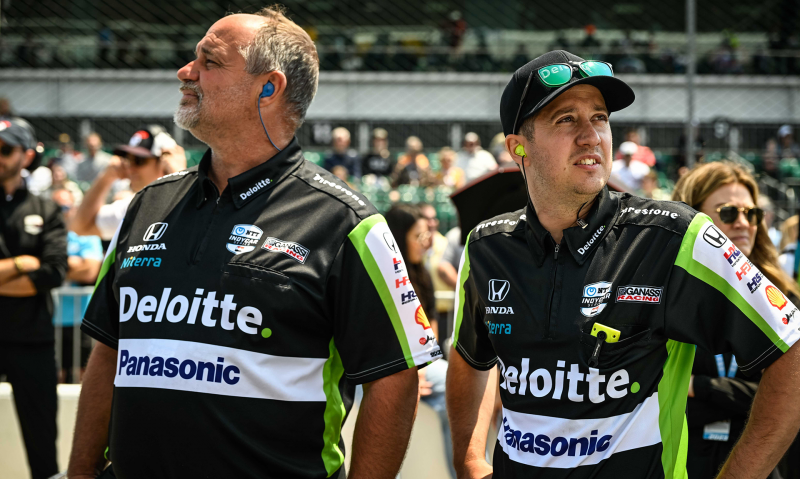
Former Army helicopter mechanic now responsible for bodywork at Chip Ganassi Racing.
Throughout the 2023 INDYCAR season we’re highlighting veterans who work within the racing series, whether for Chip Ganassi Racing (CGR), INDYCAR or other racing teams.
This week we’re highlighting Kenny Davis, who is responsible for the bodywork of CGR’s four Indy cars. Davis served in the U.S. Army from 1991 to 2000 as a helicopter mechanic, with the first five years of those in South Korea specializing in CH-47 Chinooks. He joined Chip Ganassi Racing in 2010 after spending three seasons with another team.
Davis spoke with American Legion Social Media Manager Steven B. Brooks about how he went from fixing helicopters to the INDYCAR SERIES, how he’s used that military experience in his civilian life, and being a part of a team sharing The American Legion’s “Be the One” message.
Steven Brooks: What prompted you to pursue a career in INDYCAR after being out of the military for a few years?
Kenny Davis: I was running my father-in-law’s glue factory, and as I was doing that, I came across some guys that were in racing, and one guy owned his own carbon shop. So I went to work part-time doing that and got approached … to see if I was interested in the INDYCAR SERIES because of my mechanical background working on helicopters. So I did it.
Question: Then how did you end up coming to Chip Ganassi Racing?
Davis: At the end of 2009 (my then-team) shut their doors down, and I went to (another team) for three days when I was looking for a job. Amongst all of that I had resumés everywhere, and Ganassi called me … and they offered me a position, and it was a better position for me and my family because of stability and everything like that.
Question: What’s it been like being with a team 13 years that seems to year in and year out compete for championships, produce multiple wins and compete for poles every race weekend?
Davis: It’s amazing. I think a lot to do with it is the stability of people from year to year, with not a big turnover. So it really helps to have a core group of guys who are always there to be able to keep everything running. It’s just an amazing feeling to be able to be on a winning team where you know every weekend you have a chance of winning or being on the pole. It’s just outstanding.
Question: What have you taken from your time in the Army and used in your day-to-day life, whether your personal life or there working at CGR? What did you learn through the military that you’re able to apply now?
Davis: Leadership roles. The mechanical background respects of it. On my home front I’m able to do a lot of mechanical stuff myself. And knowing you’ve got to get a task done by a certain time. You’ve got deadlines. Working on helicopters in the military, you had deadlines to make sure your aircraft was ready and flyable. And just communication. I’m big on communication. I try to talk as much as I can, keep communicating with my supervisor, engineers and everything like that. Trying to keep an open line of communication with them to be able to get a task done when assigned.
Question: You’re a veteran. What’s it like for you to see your team partner with the nation’s largest veterans service organization, seeing The American Legion at least on a car every weekend, but also seeing that No. 10 American Legion Honda livery with our Be the One message on it, knowing what that car represents?
Davis: It’s amazing. It’s wonderful to see what The American Legion can do for the veterans. And from my understanding, as soon as that (livery) got put on the car, veterans who were thinking about committing suicide were stepping forward to get the help they needed. To be able to help a veteran and being a veteran myself – I’m not one of those veterans who have needed support, but I know there are a lot out there that do need help – The American Legion is one of those organizations that help veterans in every aspect. It’s just an amazing feeling, especially seeing veterans coming up to us at the track and talking to us. I don’t tell everybody right away that I’m a veteran … and I like hearing their stories over mine, because some of them have got a lot better military stories than I do.
- Be the One

